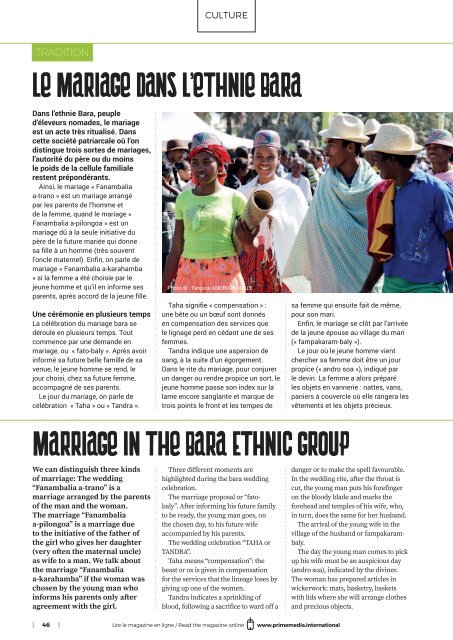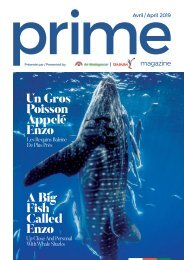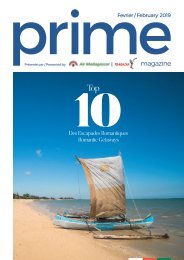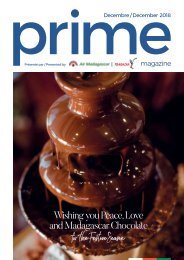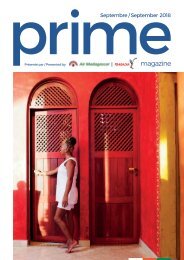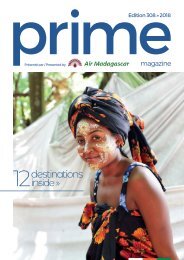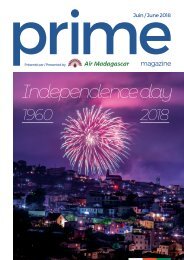PRIME MAG - AIR MAD - FEBRUARY 2018 - SINGLE PAGES -RES
You also want an ePaper? Increase the reach of your titles
YUMPU automatically turns print PDFs into web optimized ePapers that Google loves.
CULTURE<br />
TRADITION<br />
Le Mariage Dans L’ethnie Bara<br />
Dans l’ethnie Bara, peuple<br />
d’éleveurs nomades, le mariage<br />
est un acte très ritualisé. Dans<br />
cette société patriarcale où l’on<br />
distingue trois sortes de mariages,<br />
l’autorité du père ou du moins<br />
le poids de la cellule familiale<br />
restent prépondérants.<br />
Ainsi, le mariage « Fanambalia<br />
a-trano » est un mariage arrangé<br />
par les parents de l’homme et<br />
de la femme, quand le mariage «<br />
Fanambalia a-pilongoa » est un<br />
mariage dû à la seule initiative du<br />
père de la future mariée qui donne<br />
sa fille à un homme (très souvent<br />
l’oncle maternel). Enfin, on parle de<br />
mariage « Fanambalia a-karahamba<br />
» si la femme a été choisie par le<br />
jeune homme et qu’il en informe ses<br />
parents, après accord de la jeune fille.<br />
Une cérémonie en plusieurs temps<br />
La célébration du mariage bara se<br />
déroule en plusieurs temps. Tout<br />
commence par une demande en<br />
mariage, ou « fato-baly ». Après avoir<br />
informé sa future belle famille de sa<br />
venue, le jeune homme se rend, le<br />
jour choisi, chez sa future femme,<br />
accompagné de ses parents.<br />
Le jour du mariage, on parle de<br />
célébration « Taha » ou « Tandra ».<br />
Photo © : Tanjona ANDRIAMAHALY<br />
Taha signifie « compensation » :<br />
une bête ou un bœuf sont donnés<br />
en compensation des services que<br />
le lignage perd en cédant une de ses<br />
femmes.<br />
Tandra indique une aspersion de<br />
sang, à la suite d’un égorgement.<br />
Dans le rite du mariage, pour conjurer<br />
un danger ou rendre propice un sort, le<br />
jeune homme passe son index sur la<br />
lame encore sanglante et marque de<br />
trois points le front et les tempes de<br />
sa femme qui ensuite fait de même,<br />
pour son mari.<br />
Enfin, le mariage se clôt par l’arrivée<br />
de la jeune épouse au village du mari<br />
(« fampakaram-baly »).<br />
Le jour où le jeune homme vient<br />
chercher sa femme doit être un jour<br />
propice (« andro soa »), indiqué par<br />
le devin. La femme a alors préparé<br />
les objets en vannerie : nattes, vans,<br />
paniers à couvercle où elle rangera les<br />
vêtements et les objets précieux.<br />
Marriage In The Bara Ethnic Group<br />
We can distinguish three kinds<br />
of marriage: The wedding<br />
“Fanambalia a-trano” is a<br />
marriage arranged by the parents<br />
of the man and the woman.<br />
The marriage “Fanambalia<br />
a-pilongoa” is a marriage due<br />
to the initiative of the father of<br />
the girl who gives her daughter<br />
(very often the maternal uncle)<br />
as wife to a man. We talk about<br />
the marriage “Fanambalia<br />
a-karahamba” if the woman was<br />
chosen by the young man who<br />
informs his parents only after<br />
agreement with the girl.<br />
Three different moments are<br />
highlighted during the bara wedding<br />
celebration.<br />
The marriage proposal or “fatobaly”.<br />
After informing his future family<br />
to be ready, the young man goes, on<br />
the chosen day, to his future wife<br />
accompanied by his parents.<br />
The wedding celebration “TAHA or<br />
TANDRA”.<br />
Taha means “compensation”: the<br />
beast or ox is given in compensation<br />
for the services that the lineage loses by<br />
giving up one of the women.<br />
Tandra indicates a sprinkling of<br />
blood, following a sacrifice to ward off a<br />
danger or to make the spell favourable.<br />
In the wedding rite, after the throat is<br />
cut, the young man puts his forefinger<br />
on the bloody blade and marks the<br />
forehead and temples of his wife, who,<br />
in turn, does the same for her husband.<br />
The arrival of the young wife in the<br />
village of the husband or fampakarambaly.<br />
The day the young man comes to pick<br />
up his wife must be an auspicious day<br />
(andro soa), indicated by the diviner.<br />
The woman has prepared articles in<br />
wickerwork: mats, basketry, baskets<br />
with lids where she will arrange clothes<br />
and precious objects.<br />
| 46 | Lire le magazine en ligne / Read the magazine online www.primemedia.international


